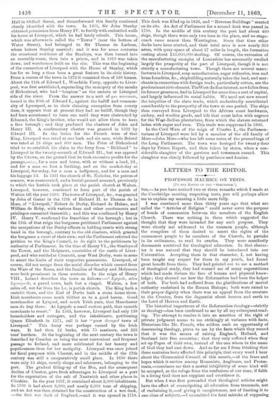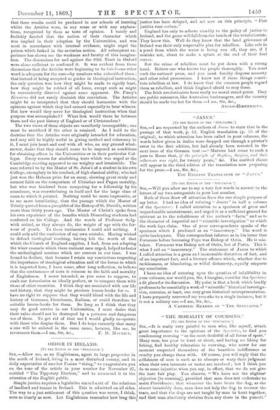LETTERS TO THE EDITOR.
PROFESSOR MA.URICE ON TESTS.
[TO THE EDITOR OF THE SFECTATOR."J
Sin,—As you have noticed two or three remarks which I made at the Cambridge meeting respecting tests, you will perhaps allow me to explain my meaning a little more fully.
I was convinced more than thirty years ago that what are called the "Articles of Religion" could never. serve the purpose of bonds of communion between the members of the English Church. There was nothing in them which suggested the thought that they were intended for any such purpose. They were clearly not addressed to the common people, although the compilers of them desired to assert the rights of the commonest people to be members of the Church, to partake in its ordinances, to read its oracles. They were manifestly documents contrived for theological education. In that charac- ter it was natural that they should be introduced into our Universities. Accepting them in that character, I, not having been taught any respect for them in my youth, had found great benefit from them. They had pointed out to me a method of theological study, they had warned me of many superstitions which had made divines the foes of human and physical know- ledge; they showed me how the Reformation had been the helper of both. For both had suffered from the glorifications of mortal authority enshrined in the Roman Bishops ; both were raised to their proper dignity when there was an appeal from the creature to the Creator, from the dogmatist about heaven and earth to the Lord of Heaven and Earth.
The historical importance of the Reformation theology—strictly as theology—has been confirmed to me by all my subsequent read- ing. The attempt to resolve it into an assertion of the right of private judgment seems to me strikingly at variance with facts. Historians like Mr. Froude, who seldom omit an opportunity of denouncing theology, prove to me by the facts which they record that it was the means of raising England, Holland, and Scotland into free countries ; that they only suffered when they set up Popes of their own, instead of the one whom in the name of God they had cast down. And so far am I from thinking that three centuries have affected this principle, that every word I hear about the (Ecumenical Council of this month,—of the fears and hopes which it excites among Romanists, Anglicans, and Protes- tants,—convinces me that a mortal infallibility of some kind will be accepted, as the refuge from the confusions of our time, if faith in a living God does not supplant and overthrow it.
But when I was first persuaded that theological articles might have the effect of emancipating all education from trammels, not of enchaining it,—of giving it completeness, not of limiting it to one class of subjects,—I committed the fatal mistake of supposing that these results could be produced in our schools of learning whilst the Articles were, in any sense or with any explana- tions, recognized by them as tests of opinion. I vainly and foolishly fancied that the notion of their character which was implied in their adoption by the Universities, and was most in accordance with internal evidence, might expel the poison which lurked in the sectarian notion. All subsequent ex- perience has shown me the weakness and fatuity of this imagina- tion. The discussions for and against the 90th Tract in Oxford were alone sufficient to confound it. It was evident from those discussions that the Articles were beginning to be hated—no other word is adequate for the case—by numbers who subscribed them ; that instead of being accepted as guides in theological instruction, the only question was how they might be made to signify least, how they might be robbed of all force, except such as might be conveniently directed against some opponent. Dr. Pusey's Eirenicon did not surely diminish this conviction. The Articles might be so interpreted that they should harmonize with the opinions against which they had seemed especially to bear witness. But how would they serve for theological instruction when that purpose was accomplished ? What link would there be between them and the past history of England or of Christendom?
The two views of these objects are manifestly incompatible ; one must be sacrificed if the other is retained. As I hold to the doctrine that the Articles were originally intended for education, and may still be highly useful in giving method and coherency to it, I must join heart and soul with all who, on any ground what- soever, desire that they should cease to be imposed as conditions for obtaining offices in the Universities or in their particular Col- leges. Every reason for abolishing tests which was urged at the Cambridge meeting appeared to me weighty and irresistible. The case referred to by the Master of St. John's of a student in his own College, exemplary in his conduct, of high classical ability, who had just won the Hulsean prize for an essay, showing great study and earnest faith on the comparison of Christian and Pagan morality, but who was hindered from competing for a fellowship by his conscience, was overwhelming in itself and for the large class of cases to which it pointed. Nothing could be more impressive, or to me more humiliating, than the passage which the Master of Trinity quoted from a pamphlet of the Bishop of St. David's, written more than thirty years ago. The Master of Christ's spoke from his own experience of the benefits which Dissenting students had conferred on his College. And the words of Professor Sedg- wick united, as they always do, the weight of age with the fer- vour of youth. To these testimonies I could add nothing. I could only add the confession of my own mistake. Having wished to defend theblogical teaching, having felt the worth of that which the Church of England supplies, I had, from not adopting the wiser counsels which these eminent men urged, helped to foster the untheological maxims which are current in our time. I was bound to declare, that because I retain my convictions respecting the importance of theological education and of the forms in which it is imparted here, I have come, after long reflection, to believe. that the continuance of tests is ruinous to the faith and morality of Englishmen. I never intended, as you seem to suppose, to exalt our formularies as ideally perfect, or to compare them with those of other countries. I think they are associated with our life and history, that they might be precious lesson-books for us. I have no right to suppose that they would blend with the life and history of Germans, Frenchmen, Italians, or could therefore be suitable lesson-books for them. So long as I think that they may do good service in our Universities, I must desire that their value should not be destroyed by a perverse and dangerous use of them. To get rid of that use I would gladly co-operate with those who despise them. But I do hope earnestly that many a one will be enlisted in the same cause, because, like me, he
reverences them.—I am, Sir, &c., F. D. MaunicE.







































 Previous page
Previous page